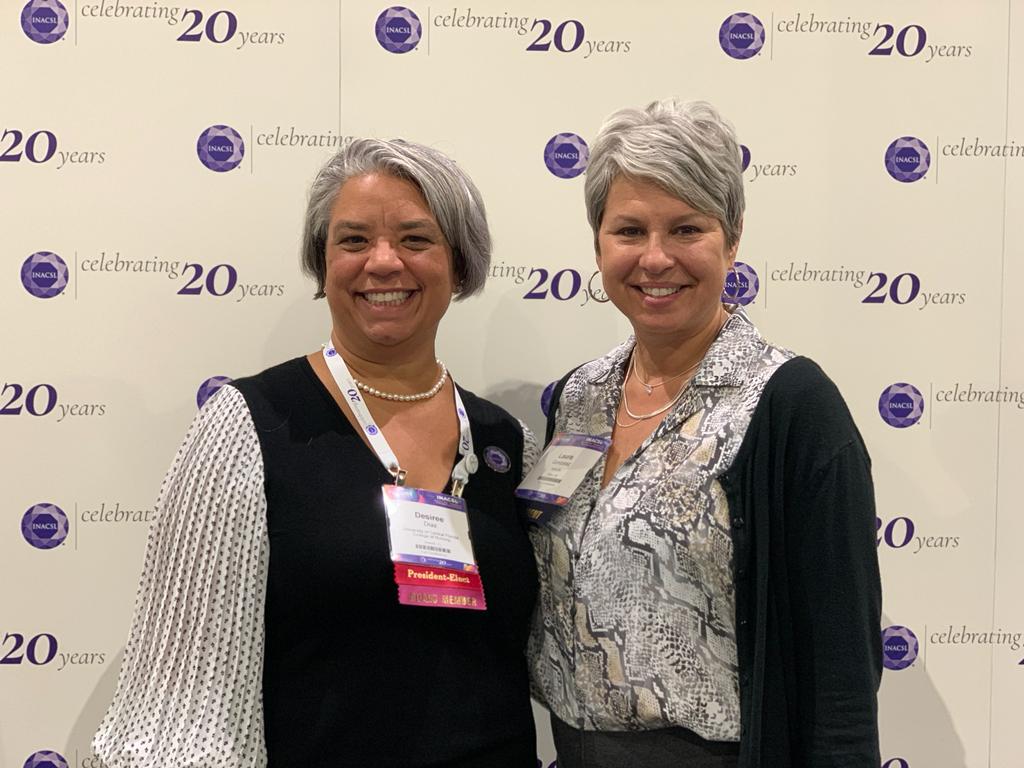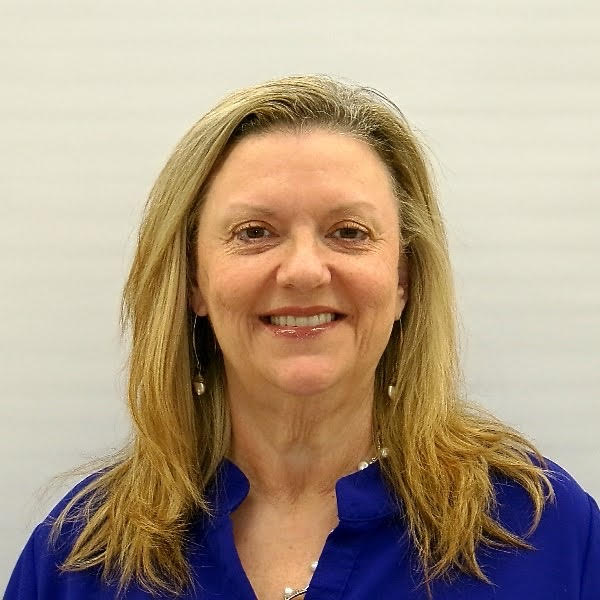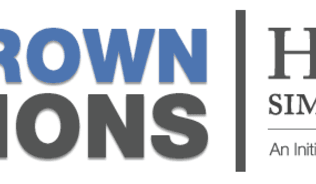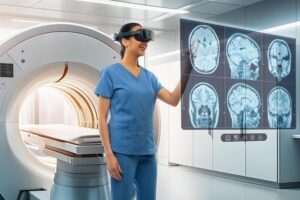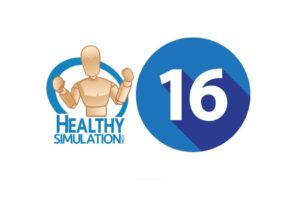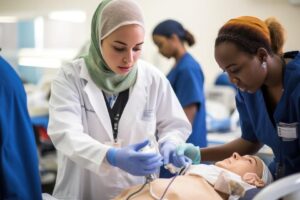INACSL’s Nursing Simulation Conference Celebrates 20 Years
This week in Providence, Rhode Island, the International Nursing Association for Clinical Simulation and Learning (INACSL) opened the 20th annual conference with attendees from around the world. The INACSL 2023 theme, Imagining the Future of Simulation, hosted 1000+ registered attendees from 18 countries. This year, INACSL is celebrating the 20th anniversary of serving the nursing simulation community. As a media partner, this article by HealthySimulation.com Content Manager and INACSL Past President Dr. Teresa Gore, will review the pre-conferences and opening day of INACSL 2023, with the note that select sessions are being recorded and available post-conference for members that were not able to attend.
INACSL has more than 2,200 members worldwide dedicated to advancing the science of healthcare simulation. Founded in 2002, INACSL’s mission is to be the global leader in the art and science of healthcare simulation through excellence in nursing education, practice, and research. INACSL23 is a leading forum for simulationists, researchers, and solution providers creating the ideal environment to gain and disseminate current, state-of-the-art knowledge in the areas of skills, simulation operations, and applications in an evidenced-based venue.
At INACSL conferences, healthcare professionals have the opportunity to network with colleagues and exhibitors, discuss best practices related to competencies, safety, and quality performance indicators, and advance the science of simulation in nursing.
Sponsored Content:
Pre-Conference Workshops at INACSL 2023
ASPE Workshop: Introduction to SP Case Development & Advanced Methods for Including Community Voices to Diversify Simulation Curriculum (morning workshop) along with an afternoon workshop on the Introduction to SP Case Development & Advanced Methods for Including Community Voices to Diversify Simulation Curriculum.
View the HealthySimulation.com LEARN CE/CME Platform Webinar How to Implement INACSL’s Healthcare Simulation Standards of Best Practice Into Your Program to learn more!
Conception to Inception: The Journey of the Simulation Scholar. Often scholars who submit/present their scholarly projects at a conference do not take the next step toward dissemination through publication. To facilitate success in the emerging scholar, four experienced simulationists shared their stories to foster success for future pioneers of scholarly publications.
Sponsored Content:
SimGHOSTS: Making Hardware “Easy” ware offered morning and afternoon pre-conference workshops. These workshops covered concepts and tips for maintaining and troubleshooting common simulation manikins and task trainer products, delving into how the software operation and programming interface can be used to enhance simulation delivery.
EHR Development: A “Hands-On Workshop on How to Build Your Own EHR” (Electronic Health Record) was conducted to address a gap in knowledge that exists for nursing educators’ ability to provide Electronic Health Records (EHRs) training to nursing students. Through active participation and following along with the step-by-step tutorial, all learners had the opportunity to create and save a Google Sheets file as a reusable EHR chart element.
Sim Center Tour: This year’s simulation tour was offered to the Rhode Island Nursing Education Center (RINEC). RINEC is 133,000 square feet of laboratory, classroom, and office space in collaboration with the Rhode Island College Onanian School of Nursing and the University of Rhode Island College of Nursing. The RINEC, overseen by the Rhode Island Office of the Postsecondary Commissioner, serves as a Providence-based facility for baccalaureate, master, and doctoral-level curriculum delivery. This tour was an excellent opportunity for participants to learn how the RINEC catalyzes existing teaching and research, creates new learning opportunities, and fosters productive collaborations and partnerships.
Exhibit Hall and Vendors Support INACSL Simulation Champions
Upon the completion of the pre-conferences, the exhibit hall opened for the attendees to visit and collaborate with vendors. INACSL is an excellent opportunity to visit with vendors. Among the vendors, attendees have the opportunity to meet and collaborate with simulation vendors of manikins, simulation skills and supplies, educational programs, publishing companies, nursing organizations, and simulation organizations.
During the Exhibit Hall Opening Reception, participants were able to view the poster presentations for the first time. The Poster Professor Rounds was held in the Exhibit Hall on Thursday afternoon. This was an exciting event that allowed the participants an excellent opportunity to meet and discuss the research and project reports. Exhibit hours continued on Thursday and Friday to allow participants time to collaborate and discuss the future of healthcare simulation.
The exhibit hall featured the Sim Media Center and the INACSL Lounge to promote a creative environment for healthcare simulationists to spark ideas and grow the future of nursing simulation. Live sessions were conducted during the exhibit hours along with interviews with the INACSL Board and committee chairs/members.
Vendor Sponsors
- Diamond Sponsor: Medical Shipment
- Gold Sponsors: Elsevier and Wolters Kluwer
- Silver Sponsors: ATI and Intelligent Video Solutions
- Bronze Sponsors: CAE, Cardionics, Cedars Sinai, Sentinel U
Keynote Speaker Dr. Tami West: Finding Hope in a World that Always Changes!
Stress Expert and “The Funny Motivational Speaker,” Dr. Tami West used her entertaining and compelling style to shine a new light on how to transform your life and discover solutions to life’s challenges. Her passion stems from a lifelong battle with an anxiety disorder which has uniquely equipped her to teach, encourage, and motivate others. Tami shared her experience with overcoming “being a perfectionist” and anxiety.
Dr. West provided a formula for Happiness: H = S + C + V. Tami’s formula states happiness is approximately 50% of a person’s set point or genetics. C is the circumstances of a person’s life, such as our health which accounts for approximately 8%. The other major influence on happiness is voluntary control. These are the factors under our control of how one reacts to people, places, and things while engaging in a meaningful life. This makes up the other 42% of our happiness. Dr. West discussed that meaningful life factors ebb and flow and do not last forever. Stay in the present time and choose how to react. People tend to identify with their emotions, such as stress, perfectionism, OCD, etc. One should not get their identity from a condition, emotion, or environment. One should not allow the world to choose their identity!
Dr. West is the author of two books: The Stress Club: Life Without the Monsters and Thrive. Tami has a podcast named “Consider Yourself Hugged”.
Friday Hayden Vanguard Lectureship: Liaw Sok Ying, PhD, MHS(ED), BHSN, ADV DIPN(NEURO), RN: CREATIVE
Liaw Sok Ying, an Associate Professor has led an interdisciplinary team to create
a desktop Virtual Reality (VR) simulation is known as Create Real-time Experience And Teamwork In Virtual Environment (CREATIVE). CREATIVE has allowed students from six healthcare courses (medical, nursing, pharmacy, physiotherapy, occupational therapy, and social work) to undertake interprofessional education (IPE) in Singapore. Using CREATIVE, Sok Ying has led the team to pursue a programmatic research approach in advancing educational innovation and research on virtual reality simulation for interprofessional education. A total of ten peer-reviewed articles were published. Her team has successfully translated CREATIVE into medicine and nursing curriculums. To date, over 2000 medical and nursing students have been trained using CREATIVE. The CREATIVE has further evolved by integrating an artificial intelligent (AI) agent into the virtual reality simulation.
Saturday Endnote: A Panel of Healthcare Simulation Experts Discussing the NCSBN National Simulation Study 10-Year Retrospective: Reflections, Lessons Learned, and Moving Forward
The theme of INACSL 2023, Imagining the Future of Simulation, this panel presentation will look into the future studies and plans to impact nursing simulation. The NCSBN National Simulation Study data collection completed in 2013 is now 10 years old. This panel composed of the study research team, a representative from the NCSBN, and some of the site coordinators, will look back on what it was like to plan and participate in the study. The ramifications for study sites and the study’s impact on the NCSBN and future planning will be discussed. The NCSBN plans for the future, if any, simulation research, will be shared.
The objectives for this presentation included:
- Discuss a high-level overview of the NCSBN Sim Study and findings.
- Describe site coordinators’ experiences and lessons learned from their study participation.
- Reflect on the ramifications of the study in the US and worldwide.
Stay tuned for more information on the discussion and results from this presentation. There will be a follow-up article to discuss the information from this presentation and updates on the use of nursing simulation to replace clinical hours in the United States.
Example of Concurrent Sessions at INACSL 2023
Concurrent sessions were held that addressed the learning needs and professional development opportunities for faculty members, simulationists, simulation operations specialists, and administrators with simulation oversight or duties. Here are some of the sessions on Thursday. The Healthcare Simulation Standards of Best Practice Sessions were conducted to focus on the standards and how to incorporate them into a simulation program.
Low-Cost Asynchronous Virtual Simulation for Graduate-Level Nursing Students
The presenters had identified a gap in online graduate-level nursing education for cost-effective, customized virtual simulation experiences that focused on Doctor of Nursing Practice students to perform in the role of hospital leaders in communicating medical errors to a patient’s family member. The technology of low or no cost was used to create an immersive experience that allowed students access to a timeline of critical events, recorded video interviews, and a live interaction with the family member. The majority of students reported the teaching method was effective and motivating. A majority of the students also reported the virtual simulation covered critical content necessary for the mastery of advanced practice nursing.
Prioritizing Competencies Needed by Simulation Facilitators: A Q Methodology
The presenters discussed their research on simulation facilitators’ effectiveness. In order to conduct effective, high-quality healthcare simulations, simulation facilitators require professional development to obtain the skills required for effective facilitation. The Healthcare Simulation Standards of Best Practice established the importance of ongoing professional development. The Facilitator Competency Rubric establishes facilitator competencies, but a gap exists in best practices for prioritizing competency development. This presentation discussed the competencies most important to address during simulation facilitation professional development for novice simulationists. The results of the research were analyzed using a Q-methodological approach guided by NLN Jeffries Simulation Theory, which asked 73 simulationists to sort 29 statements.
Simulationists emphasized the importance of debriefing and agreed that learning to create a safe student-centered learning environment was most important, whereas learning simulation design administrative tasks was least important. The first viewpoint focused on the process of facilitating metacognition during debriefing, whereas the second viewpoint was more about how the facilitator structures debriefing.
The Impact of Block Scheduling in Simulation on Faculty Development and Student Satisfaction
This session explored an innovative approach to address limited access to clinical sites and enrollment expansions are driving nursing programs to expand the use of simulation. However, simulation education requires different knowledge, skills, and competencies of faculty compared to traditional lecturing or clinical instruction. Using the Donabedian Structure-Process-Outcome Framework, the impact of 4-8 hour block scheduling on faculty development was measured by the facilitator’s/teacher’s knowledge and comfort and student learning satisfaction with simulation. The presenters discussed the increase in knowledge and satisfaction of all involved and have changed their practice.
Teresa Gore, PhD, DNP, APRN, FNP-BC, CHSE-A, FSSH, FAAN – Dr. Gore has experience in educating future nurses in the undergraduate and graduate nursing programs. Dr. Gore has a PhD in Adult Education, a DNP as a family nurse practitioner, and a certificate in Simulation Education. Dr. Gore is an innovative, compassionate educator and an expert in the field of healthcare simulation. In 2007l Teresa started her journey in healthcare simulation. She is involved in INACSL and SSH. She is a Past-President of INACSL and is a Certified Healthcare Simulation Educator Advanced (CHSE-A). In 2018, she was inducted as a Fellow in the American Academy of Nursing (FAAN). In 2021, she was inducted as a Fellow in the Society of Simulation in Healthcare Academy (FSSH) and selected as a Visionary Leader University of Alabama at Birmingham School of Nursing Alumni. During her career, Dr. Gore has led in the development and integration of simulation into all undergraduate clinical courses and started an OSCE program for APRN students. Her research interests and scholarly work focus on simulation, online course development and faculty development. She has numerous invited presentations nationally and internationally on simulation topics.
Sponsored Content:



